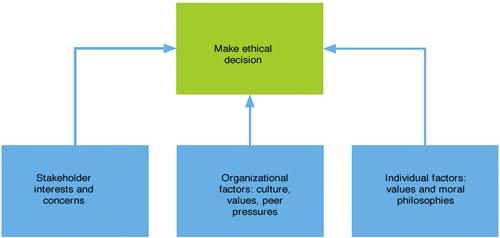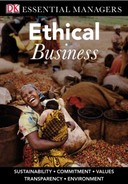Setting the Context
How are ethical decisions made within your organization? What factors and what people exert an influence on outcomes, and can the process be improved? Answering these questions will help you set a robust framework for ethical decision-making.
Making decisions
All ethical decisions are made within the context of the needs and expectations of stakeholders, the culture of the organization, and the values and drives of the individuals within it.
Stakeholders—your employees, suppliers, regulators, special-interest groups, communities, and the media—have a wide range of interests, concerns, and potential impacts. These need to be pinpointed, and the intensity, or importance, of each carefully assessed to ensure that your ethical framework accommodates decision-making in all key areas.
Culture and values
Organizational culture consists of the values, norms, and behaviors shared by the organization. It is a collective understanding about what is expected and accepted, and it defines the way decisions are made on a daily basis. In practice, internal culture may be at odds with the values stated in external communications, such as the corporate website; it may allow for, or even tacitly condone, unethical behavior that boosts profitability.
Most studies suggest that organizational factors are key in the workplace—ethical decisions are most strongly influenced by the internal culture and by co-workers, superiors, and subordinates. Indeed, employees are more likely to be guided by their co-workers’ thoughts than by their personal values; but this does not mean that the role of an individual’s personal moral philosophy can be ignored. Everyone has their own perception of right and wrong, shaped by factors such as education, nationality, age, and gender and this will to some extent influence the decisions they make.
The importance of individual factors varies with profession. For example, an environmental engineer working alone on a project has more opportunity to make an independent ethical judgment than a food retailer deciding whether or not to stock a particular brand of coffee; here the judgment is more likely to be made by a board or committee, with reference to predefined rules and regulations.
The influences on an ethical decision
Make ethical decision
-
Stakeholder interests and concerns
-
Organizational factors: culture, values, peer pressures
-
Individual factors: values and moral philosophies
-

